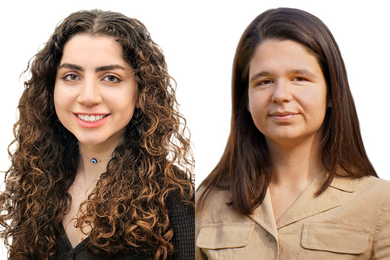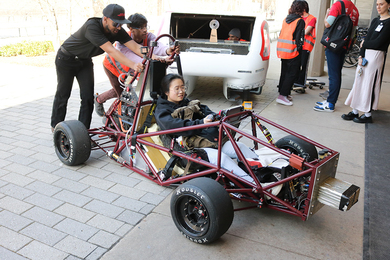The National Cancer Institute (NCI) recently assembled a Mouse Models of Human Cancers Consortium -- co-led by Associate Professor Tyler Jacks of MIT -- by funding 19 new groups of investigators from more than 30 institutions in the United States.
"New mouse model technology provides a unique opportunity for NCI to accelerate the tempo at which mouse models of cancer are developed by the scientific community," said Dr. Richard D. Klausner, NCI director. "We believe that creating a consortium now will pay huge dividends in progress in cancer research in years to come."
Leaders of the new consortium are Professor Jacks and Professor Terry Van Dyke of the University of North Carolina at Chapel Hill.
Consortium members aim to develop models that parallel the ways that human cancers develop, progress and respond to therapy or preventive agents.
"The consortium is an extraordinary opportunity that should greatly improve our ability to understand the process of cancerous changes. We are also trying to enhance our ability to evaluate a range of biomarkers prior to their clinical use," said Dr. Dinah Singer, director of NCI's Division of Cancer Biology.
Initially, the 19 groups within the consortium will work separately on developing and evaluating mouse models for cancers of eight major organ systems -- breast, prostate, lung, ovary, skin, blood and lymph system, colon and brain. Each group will work to apply the most up-to-date mouse genetic engineering strategies and validation technologies to models of their choosing, said Dr. Singer.
"Then, the consortium will provide easy ways for the groups to share their observations and accomplishments, and explore possible solutions to any technological challenges that presently limit mouse models as effective mimics of human disease," she said.
The models also will be used to support discovery of new cancer-related genes and to disclose the pathways and processes through which cancer-related genes affect human cancer development, promote tumor progression and facilitate metastasis. Ultimately, the models will be used to test new approaches to diagnosis and medical care for cancer.
The consortium will establish and maintain a resource of validated live mouse models, cryopreserved embryos and sperm as a resource for researchers. It also will set standards for integrating information and tracking the progress of the models being derived and validated, with the help of non-government advisors.
"Feedback and insight offered by potential and existing users of the mouse models, and by clinical and basic cancer researchers, is essential to the success of the consortium," said Dr. Cheryl Marks, who heads the team of NCI staff who will work with the consortium leadership.
To further that goal, the NCI will establish Internet discussion groups on preclinical mouse models, specific models such as breast cancer models, genomic technologies or other themes.
"The NCI will give the cancer research community access to the models, the experimental tactics used to derive and validate the models, and the knowledge about the models and their practical uses that are developed," said Dr. Marks.
Within several months, the NCI plans to activate an Internet site with information about the consortium, its activities and its progress. For a list of consortium grantees and contact information, call (301) 496-6641 or click on "press releases" at the NCI web site.
A version of this article appeared in MIT Tech Talk on January 26, 2000.





